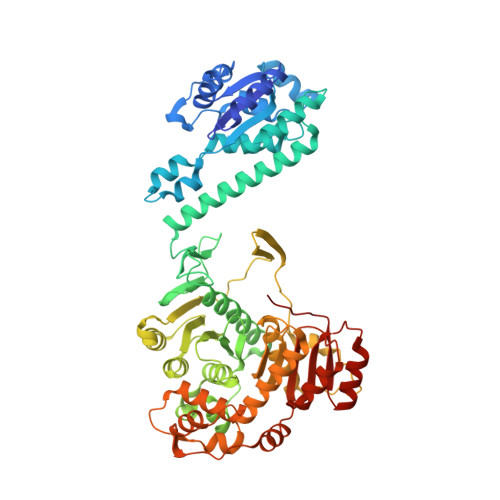Discovery of N-(6-Fluoro-1-oxo-1,2-dihydroisoquinolin-7-yl)-5-[(3R)-3-hydroxypyrrolidin-1-yl]thiophene-2-sulfonamide (LSN 3213128), a Potent and Selective Nonclassical Antifolate Aminoimidazole-4-carboxamide Ribonucleotide Formyltransferase (AICARFT) Inhibitor Effective at Tumor Suppression in a Cancer Xenograft Model.
Fales, K.R., Njoroge, F.G., Brooks, H.B., Thibodeaux, S., Torrado, A., Si, C., Toth, J.L., Mc Cowan, J.R., Roth, K.D., Thrasher, K.J., Frimpong, K., Lee, M.R., Dally, R.D., Shepherd, T.A., Durham, T.B., Margolis, B.J., Wu, Z., Wang, Y., Atwell, S., Wang, J., Hui, Y.H., Meier, T.I., Konicek, S.A., Geeganage, S.(2017) J Med Chem 60: 9599-9616
- PubMed: 29072452
- DOI: https://doi.org/10.1021/acs.jmedchem.7b01046
- Primary Citation of Related Structures:
5UY8, 5UZ0 - PubMed Abstract:
A hallmark of cancer is unbridled proliferation that can result in increased demand for de novo synthesis of purine and pyrimidine bases required for DNA and RNA biosynthesis. These synthetic pathways are frequently upregulated in cancer and involve various folate-dependent enzymes. Antifolates have a proven record as clinically used oncolytic agents. Our recent research efforts have produced LSN 3213128 (compound 28a), a novel, selective, nonclassical, orally bioavailable antifolate with potent and specific inhibitory activity for aminoimidazole-4-carboxamide ribonucleotide formyltransferase (AICARFT), an enzyme in the purine biosynthetic pathway. Inhibition of AICARFT with compound 28a results in dramatic elevation of 5-aminoimidazole 4-carboxamide ribonucleotide (ZMP) and growth inhibition in NCI-H460 and MDA-MB-231met2 cancer cell lines. Treatment with this inhibitor in a murine based xenograft model of triple negative breast cancer (TNBC) resulted in tumor growth inhibition.
- Lilly Research Laboratories, Eli Lilly and Company , Indianapolis, Indiana 46285, United States.
Organizational Affiliation:



















